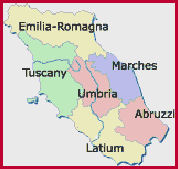
|
The Central Region, which as history
tells us is the heart of the Roman Empire, is where the most popular Italian
wines can be found. Here we have ... aaaah YES! Lambrusco, Verdicchio, and
going a very long way back is Chianti (remember those bottles in the 70's with
rope wrapped around the bottle that was often used as a candle holder when
empty?) and now mainly produced for export. Perfectly suited to this
microclimate is the popular Sangiovese grape and her many varieties. Coupled
with ancient traditions, modern winemaking techniques find their way into
these regions, where vintners are always finding ways to improve on an already
productive and profitable industry.
|
Emilia-Romagna
~ bordered by the famous Po River and the Adriatic Sea, this area is one of
the flattest regions in Italy. Italians believe the soil here is perhaps the
most fertile in the entire country, leading to great agricultural rewards.
Here we have a region producing almost three hundred types of both reds and
whites - something for everyone. Aaah ... YES! Lambrusco (you can tell that
this is one of, if not, MY FAVOURITE) is the typical grape variety grown in
the northern area, while in the southern area of this region, Albana and
Sangiovese take the lead. So here in Emilia-Romagnia such reds as: Lambrusco,
Merlot, Cabernet Sauvignon, Sangiovese (another favourite of mine), and
Barbera are produced and Albana, Chardonnay, Sauvignon, and Riesling for the
whites.
Tuscany
(Toscana) ~ this area is somehow synonymous with wine and
Italian cuisine. This region has the reputation for producing some of the best
table wines in the world. This is the home of Chianti. It is also home of the
other two full-bodied reds, namely Brunello and Vino Nobile (which began
production in the 1300s). Worthy of mention here is the Tuscan grape,
Sangiovese, with its etymology from sanguis, the Latin term for "blood"
and from Jove, giving rise to the meaning of "blood of Jove," suggesting an
old production. In contrast to this, we have the local strain of Sangiovese
called "Prugnolo Gentile" or nice little plums. In this area there are
mountains, lush green valleys, lakes and islands ... the perfect recipe for
warm passionate reds and crisp, sparkling, delightful whites. Here in Tuscany,
vineyards are planted in various fashions - among which is the "settonce" pattern
- a Latin way of planting one vine in the centre of a series of plants formed
hexagonally. Another design is called "la vina tonda" (the
round vineyard) where the vines can be seen in a spiralling pattern. These
various methods of density planting are sometimes used as experiments to
determine the effect on quality and productivity.
Bella Tuscany!
The Marche or Marches
~ here again we have an area that is no stranger to vineyards. The grape has
been at home here for centuries and it is one of the most important of
agricultural products. The reds are in greater abundance here than the whites
but it is the whites from this area however that find themselves more globally
consumed. Although just twenty-four types of wine are produced here,
Verdicchio finds herself at the top of the list.
Umbria
~ it is geographically smack in the center of Italy and as such is one of the
few Italian regions that does not lie close to the sea and because of it's
situation, it is an ideal spot for growing olives as well as grapes.
Relatively rebirthed to the world of wine producing, this area has made a
comeback on the wine scene the past twenty odd years, regaining knowledge from
old tradition and now producing excellent selections of reds and whites.
Latium
(Lazio) ~ here we have primarily volcanic terre, with unique and
varied landscapes connecting to nearby regions. Since Imperial Roman times
when wine "flowed" and was most highly regarded, the humble grapevine has been
an essential part of life in this area, so much so that today the region
continues to produce quite a variety of red table wines.
Abruzzi
~ snuggled cosily within the mountains of central Italy, this area is most
suitable for grape cultivation. Although only twenty-two varietals are grown
here, the Sangiovese, Trebbiano, and Montepulciano grapes produce quite a
variety of wines, such as Trebbiano d'Abruzzo, Riesling, Merlot, Chardonnay,
and Cabernet.
Back to Wine
Tours.
|